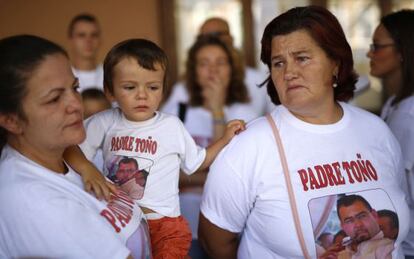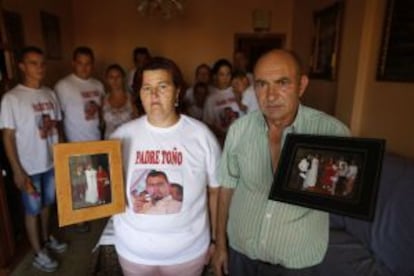Family of Spanish priest accused of gang ties in El Salvador waits on tenterhooks
Father Antonio Rodríguez was arrested over links to country’s notorious Maras organizations

Father Toño’s family is shaken up. On July 29, El Salvador ordered the arrest of the 38-year-old Spanish priest, who has dedicated 14 years of his life to the prevention of Mara gang-related violence. Since then, Antonio Rodríguez Tercero’s parents, six brothers and sisters, and friends have not been able to sleep as they wait for the case to be resolved. Neither have they been able to speak to him. The priest’s lawyer and the Spanish Embassy give them updates about the case. For the last three Sundays, the family and a small group have been gathering in front of the town hall in Daimiel, in the central Spanish region of Castilla-La Mancha, where the priest was born, to call for justice. About 50 people wearing white t-shirts with a photo of Father Toño took part in the demonstration.
Although it is 36ºC in Daimiel, the Rodríguez family is undeterred in its quest to condemn this injustice. They stand together and talk with apparent ease and openness about the sly tricks Father Toño has been playing and the humanitarian battles he has been fighting since he was a child. Cristina, his 33-year-old sister, happily recalls one of her brother’s first pranks. “When he was eight years old and I was three, he told me to touch the blender because it would tickle,” she says. “Thank goodness I didn’t do it with my fingers!”
Father Toño has been accused of bringing prohibited objects such as cellphones into prisons and of having direct ties to various Mara leaders. Both investigations are in the preliminary stages. It could take up to six months for the authorities to make a decision. On Friday, Father Toño was transferred to a prison under the supervision of the Salvadoran police’s narcotics division after spending a week in hospital with low blood pressure. His lawyers intend to appeal the judge’s decision and the Spanish Foreign Affairs Ministry said it was keeping up with the case, though declined to share any details.
We are asking for justice, not benevolence,” the mayor says
Cristina has taken two trips to El Salvador to see her brother. She said Father Toño set up workshops, clinics equipped with machines for removing gang tattoos, and schools for children. “After giving mass every morning, there is always a line of people waiting outside to ask him for help. I remember once a woman told him that her 10-year-old son had disappeared. We spent two days going all over the place until we found the boy, his body all cut up.”
Father Toño sometimes visited Mara members in prison. “But that’s because they ask him to,” Cristina explains. “The last time he went, it was because the prison warden asked him to investigate the death of a gang member. When we arrived one of them told him: ‘He was brought here for abusing a minor; we don’t tolerate that.’ And he didn’t last 18 minutes [while they beat him with three different bats].”
Antonio Rodríguez Tercero began attending the old Cristo de la Luz boarding school in Daimiel when he was six years old. “He only got out at weekends and he always brought me a carnation,” his mother, Carmen, says while wiping away her tears with a handkerchief. At 10 years old, he went to Zaragoza to join the Congregation of the Passion of Jesus Christ and stayed there until he finished his novitiate. He worked as a waiter to earn money to pay for seminary courses. He then moved to Madrid for two years before heading to El Salvador. “He wanted to follow in the footsteps of Monsignor Romero [a defender of human rights who was assassinated in the Central American country] and that’s why he chose that destination,” his mother says, her blue eyes shining like her son’s.

The Rodríguez Tercero family’s ties to El Salvador have overcome great distances. They adopted an eighth member: a Salvadoran woman who fled from violence with her three-year-old daughter. Her mother and 11 other people were burned alive when the Maras set fire to a bus. The gang also killed her husband. According to her account – she has asked not to be identified – he joined a gang when he was nine years old. Then he had eight years of rehabilitation while working with Father Toño. Still, the Mara tattoos on his body were a kind of sentence. The rival gang shot and killed him. In December 2013, the priest offered the woman the opportunity to move to Spain and live with his family. “I accepted for my daughter's sake,” she says. “Father Toño has been my priest, friend, and counselor. He motivates the kids. He teaches them that there are other ways to live, not just by robbing and killing. He helps them find inner peace.”
The apartment where Father Toño’s parents live has just enough space for everyone to sit down and eat. It is decorated with pictures of the children and religious images. “This one is Antonio on the day of his first communion,” one of his sisters says. “And when he graduated from his novitiate,” adds the father, a man of few words. His mother cannot help but smile when she talks about her eldest son. “He was very restless even when he was a baby. He had a need for speed. He was obedient but he was always going out for bread.”
In Daimiel, no one has
a bad word to say
about the priest
Despite the accusations, no one in Daimiel has a bad word to say about Father Toño. Mayor Leopoldo Sierra says: “We are not asking for benevolence here but for justice. No one questions his honor, integrity, and dedication to others.” His friends, cousins and church colleagues all say the same thing. Manuel Antonio Vázquez, a fellow member of his congregation, said Father Toño is a direct person. “He never hides the truth. He says what he thinks without hurting. He is very spontaneous. He tells jokes, analyzes the state of the world and keeps an eye on everyone.”
The priest usually visited his family in the summer. This summer, his close ones are waiting on tenterhooks for his release.
Translation: Dyane Jean François
Tu suscripción se está usando en otro dispositivo
¿Quieres añadir otro usuario a tu suscripción?
Si continúas leyendo en este dispositivo, no se podrá leer en el otro.
FlechaTu suscripción se está usando en otro dispositivo y solo puedes acceder a EL PAÍS desde un dispositivo a la vez.
Si quieres compartir tu cuenta, cambia tu suscripción a la modalidad Premium, así podrás añadir otro usuario. Cada uno accederá con su propia cuenta de email, lo que os permitirá personalizar vuestra experiencia en EL PAÍS.
¿Tienes una suscripción de empresa? Accede aquí para contratar más cuentas.
En el caso de no saber quién está usando tu cuenta, te recomendamos cambiar tu contraseña aquí.
Si decides continuar compartiendo tu cuenta, este mensaje se mostrará en tu dispositivo y en el de la otra persona que está usando tu cuenta de forma indefinida, afectando a tu experiencia de lectura. Puedes consultar aquí los términos y condiciones de la suscripción digital.








































